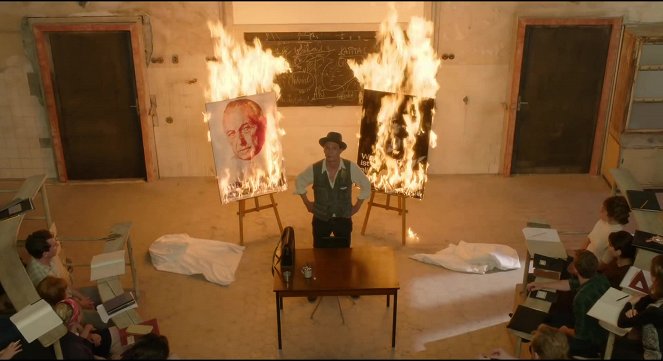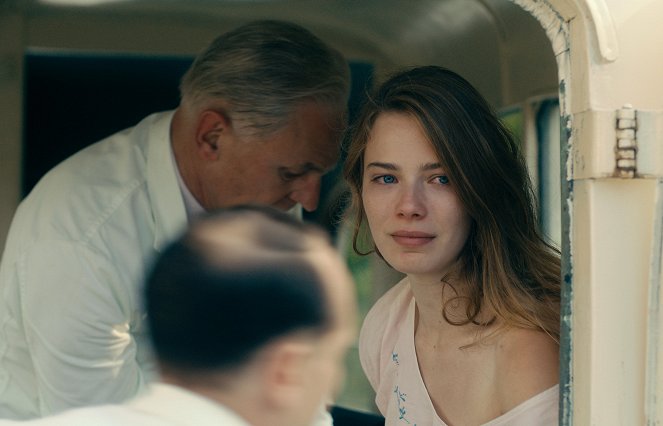Director:
Florian Henckel von DonnersmarckCámara:
Caleb DeschanelMúsica:
Max RichterReparto:
Tom Schilling, Sebastian Koch, Paula Beer, Saskia Rosendahl, Oliver Masucci, Hanno Koffler, Cai Cohrs, Evgeniy Sidikhin, Ulrike C. Tscharre, Jörg Schüttauf (más)Sinopsis(1)
Kurt es un joven estudiante de arte en la Alemania del Este. Está enamorado de su compañera de clase, Ellie. El padre de ella, el Professor Seeband, un famoso médico, no aprueba la relación de su hija y está decidido a destruirla. Lo que ninguno de ellos sabe es que sus vidas están conectadas por un terrible crimen cometido hace décadas. (Avalon Audiovisual Esp.)
(más)Videos (16)
Reseñas (3)
La segunda entrega del desafío cinematográfico en cuarentena, Alemania. Otra obra del director von Donnersmarck, que te satisface al verla a pesar de presenciar una serie de momentos dolorosos, actos y eventos. Las mejores escenas están relacionadas con la presencia diabólica de Sebastian Koch, quien actúa de manera impecable. Tom Schilling no se queda atrás, gracias a Oh, chico, no puedo decepcionarme ni sorprenderme desagradablemente. Y ambas hermosas actrices alemanas me han cautivado, así que me centraré en ellas. La excelente producción alemana, aunque se sienta un poco larga, lo noté en la tercera hora de duración total.
()
The monumental failure of a bloated filmmaker in which virtually all the necessary items of model midcult can be ticked off. But it's also one of the important cinematic milestones of the current post-fact era, in which it's now defensible for most to emotionally attach themselves to untruth if it suits their needs. ____ From a purely cinematic standpoint, it's a delicious catalogue of creative mistakes in the field of biopics. He has three hours to explain his position, but he can't do it without a final monologue to the audience. He can't cinematically explain the uniqueness of the art on display, so he helps himself with dramatic loops and constant commentary on what's going on. It shows a completely abysmal handling of the budget, which is wasted here on completely unnecessary and digitally slick scenes from pre-war Dresden or a wrecked Messerschmidt. As for the protagonist's wife, I can no longer remember her name, but I could have recreated her breasts out of modelling clay with millimeter precision blindfolded, because her character communicates with the viewer exclusively through them for two thirds of the film. The film is about visual art, and it tells the story primarily through words. Most importantly, as much as it tries to be educational, it falls permanently into terrible kitsch virtually every chance it gets. That in itself says nothing flattering about the filmmaker. Never Look Away has definitely screwed the author here. Over a table and with no gel. ____ Nevertheless, the film and its universally positive reception is actually a picture and a warning of the current age of convenient rationalizing untruth. It is common knowledge that the viewer has an inherent need to exalt and tolerate a film more if it labels itself as being based on true events. Such films have their procedures, their nature, ideally building an effort to accurately create the setting and character of the persons and situations depicted so as not to remain indebted to reality. But what about films that use the same means, shielding themselves from reality and perhaps even basing much of it on reality, but then altering significant or essential parts in favor of dramatization or proving their own truth? Never Look Away is in fact a largely fabricated blame on the first thirty years of the life of the artist Gerhard Richter, whom the film essentially exploits. It picks out the most piquant moments of his life, which it then arbitrarily incorporates in implausible scripted twists in the style of "it's not true, but it could be". Which, among other things, makes it clear that focusing on the purely artistic side of the hero's life would not, according to the filmmakers, make the film itself work. In fact, they admit their own creative limitations in what they want to tell. The universally positive reaction of the non-professional and professional public to this mismanaged quack is then an obvious reaction to the power of the "real event", which did not occur here, but the film nevertheless ably builds up this illusion. In any case, there is, I fear, a certain cinematic trend ahead (see, for example, the similarly mendacious Bohemian Rhapsody) of loose adaptations of reality that will tell nice and informative stories about perhaps unlikable and uninspiring people, but we won't see them as such in the film, or in their lives, really. We will see what we want to see in people, how we want to see them, so we can remain in our comfort zones and wake up again every morning to a world where everything is as we imagine it. Except that it isn't... Pseudo-reality as escapism. Warning against these films should be the mission of film criticism. Casual audiences can't be blamed for falling for it.
()
(menos)
(más)
I won't express myself extensively about the content of the film; let everyone make their own picture of it. I would just like to mention my own observation. Despite all the unpleasant plot twists, I feel that the film Never Look Away is a small celebration of life in all its beauty, for which even the three hours of pure time are a tight fit. Among other things, I really liked the cast, which was led by Tom Schilling, who was almost unknown to me until now. Sebastian Koch was traditionally great in the role, Saskia Rosendahl was excellent, and I was also impressed by Paula Beer. The overall mood of the drama was enhanced by the absolutely haunting musical accompaniment at the end. (85%)
()



